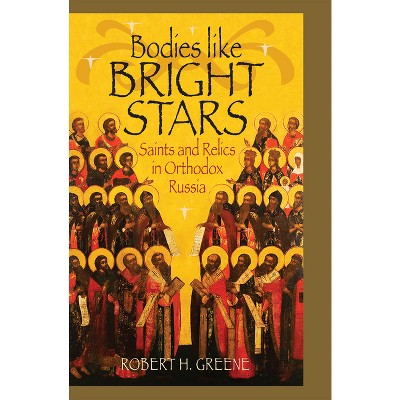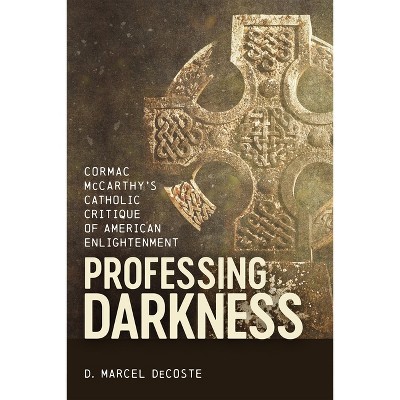Sponsored

The Soldier's Two Bodies - by James Greene (Hardcover)
$50.00
In Stock
Eligible for registries and wish lists
Sponsored
About this item
Highlights
- In The Soldier's Two Bodies, James M. Greene investigates an overlooked genre of early American literature--the Revolutionary War veteran narrative--showing that it by turns both promotes and critiques a notion of military heroism as the source of U.S. sovereignty.
- About the Author: James M. Greene is assistant professor of English at Indiana State University.
- 224 Pages
- Literary Criticism, Subjects & Themes
Description
About the Book
"In The Soldier's Two Bodies, James M. Greene investigates an overlooked genre of early American literature--the Revolutionary War veteran narrative--showing that it by turns both promotes and critiques a notion of military heroism as the source of U.S. sovereignty. Personal narratives by veterans of the American Revolution indicate that soldiers in the United States have been represented in two contrasting ways from the nation's first days: as heroic symbols of the body politic and as human beings whose sufferings are neglected by their country"--Book Synopsis
In The Soldier's Two Bodies, James M. Greene investigates an overlooked genre of early American literature--the Revolutionary War veteran narrative--showing that it by turns both promotes and critiques a notion of military heroism as the source of U.S. sovereignty. Personal narratives by veterans of the American Revolution indicate that soldiers in the United States have been represented in two contrasting ways from the nation's first days: as heroic symbols of the body politic and as human beings whose sufferings are neglected by their country.
Published from 1779 through the late 1850s, narrative accounts of Revolutionary War veterans' past service called for recognition from contemporary audiences, inviting readers to understand the war as a moment of violence central to the founding of the nation. Yet, as Greene reveals, these calls for recognition at the same time underscored how many veterans felt overlooked and excluded from the sovereign power they fought to establish. Although such narratives stem from a discourse that supports centralized, continental nationalism, they disrupt stable notions of a unified American people by highlighting those left behind. Greene discusses several well-known examples of the genre, including narratives from Ethan Allen, Joseph Plumb Martin, and Deborah Sampson, along with Herman Melville's fictional adaptation of the life of Israel Potter. Additional chapters focus on accounts of postwar frontier actions, including narratives collected by Hugh Henry Brackenridge that voice concerns over populist violence, along with stranger narratives like those of Isaac Hubbell and James Roberts, which register as fantastic imitations of the genre commenting on antebellum racial politics. With attention to questions of historical context and political ideology, Greene charts the process by which veteran narratives promote exception, violence, and autonomy, while also encouraging restraint, sacrifice, and collectivity. Revolutionary War veteran narratives offer no easy solutions to the appropriation of veterans' lives within military nationalism and sovereign violence. But by bringing forward the paradox inherent in the figure of the U.S. soldier, the genre invites considerations of how to reimagine those representations. Drawing attention to paradoxes presented by the memory of the American Revolution, The Soldier's Two Bodies locates the origins of a complicated history surrounding the representation of veterans in U.S. politics and culture.Review Quotes
A major work of recovery and analysis, Greene's engaging study of Revolutionary War veteran narratives offers fresh perspective on the soldier, the military, and the nation. Focusing on tensions between soldiers' military and civilian bodies in the narratives of Ethan Allen, Israel Potter, Deborah Sampson, and many other veteran writers, Greene shows how the veteran became a cultural nexus for imagining war in relation to American sovereignty.--Robert S. Levine, author of Race, Transnationalism, and Nineteenth-Century American Literary Studies
James Greene takes up the notoriously elusive concept of popular sovereignty and brings it to life via the lives and narratives of a fascinating array of Revolutionary-era soldiers. Drawing on a wide range of historical, literary and theoretical texts, Greene sheds light on the complex interplay of violence and vulnerability, self-determination and subordination, that constitutes the soldier's 'two bodies.'--Paul Downes, author of Democracy, Revolution and Monarchism in Early American Literature
This is a fascinating, incisive study about the paradoxes of popular sovereignty that underwrite eighteenth- and nineteenth-century veteran narratives. The care with which it has been researched and written distinguishes it as a valuable contribution to our understanding of the period's literary, military, and political history, and as a touching, respectful tribute to the service of U.S. veterans, past and present.--Siân Silyn Roberts, author of Gothic Subjects: The Transformation of Individualism in American Fiction, 1790-1861
About the Author
James M. Greene is assistant professor of English at Indiana State University.Dimensions (Overall): 8.7 Inches (H) x 5.8 Inches (W) x .9 Inches (D)
Weight: .9 Pounds
Suggested Age: 22 Years and Up
Number of Pages: 224
Genre: Literary Criticism
Sub-Genre: Subjects & Themes
Publisher: LSU Press
Theme: Historical Events
Format: Hardcover
Author: James Greene
Language: English
Street Date: January 13, 2020
TCIN: 1007427382
UPC: 9780807171646
Item Number (DPCI): 247-47-9905
Origin: Made in the USA or Imported
If the item details aren’t accurate or complete, we want to know about it.
Shipping details
Estimated ship dimensions: 0.9 inches length x 5.8 inches width x 8.7 inches height
Estimated ship weight: 0.9 pounds
We regret that this item cannot be shipped to PO Boxes.
This item cannot be shipped to the following locations: American Samoa (see also separate entry under AS), Guam (see also separate entry under GU), Northern Mariana Islands, Puerto Rico (see also separate entry under PR), United States Minor Outlying Islands, Virgin Islands, U.S., APO/FPO
Return details
This item can be returned to any Target store or Target.com.
This item must be returned within 90 days of the date it was purchased in store, shipped, delivered by a Shipt shopper, or made ready for pickup.
See the return policy for complete information.





